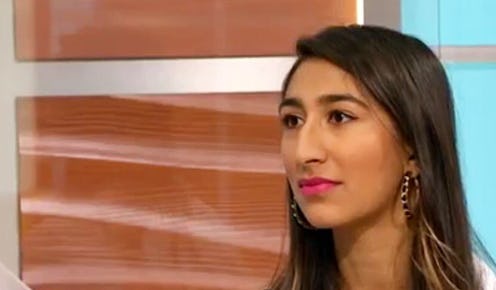The great thing about social media is that it is often times used as a platform for people who want to push against the status quo and beehive mentality, and share their own radical thoughts on beauty and body acceptance. That's exactly what the #SideProfileSelfie campaign does, obliterating the idea that a bigger nose can't be beautiful. There have been a bevvy of social media campaigns over the past decade that have majorly helped change how people look at their bodies and their reflections. From the body diversity and body positivity movements pushing for people to leave toxic thinspiration at the door, and instead embrace their stretchmarks, dimples, and rolls as they are, to the natural hair movement helping women of color fight against the pressures of Eurocentric beauty standards, to campaigns like Dove's "Make Peace with Dry Skin" campaign helping those with skin conditions shake off societal stigma, social media helps change people's perspectives.
And the reason that it's able to influence so many people's perceptions about their own bodies is because it isn't a mainstream ad campaign being tossed at you, but thousands of real people with real insecurities throwing their self-doubts aside and embracing themselves as they are. That's powerful to see, and makes the person with similar insecurities feel like they're allowed to do the same, too.
And that's where the #SideProfileSelfie campaign came in. Radhika Sanghani, a freelance journalist, started the movement to shift some of that body positivity towards noses. With the hashtag, she asked people with big noses to share photos of themselves from the side, showing off their profile and embracing the characteristic. She hopes to enstill the idea that "bigger" noses are just as beautiful as small ones.
"In our society, big noses have been taboo for all too long," Sanghani wrote in women's magazine Grazia, launching the hashtag in her piece. "Times are changing and fashion and beauty is becoming more diverse than ever." She mentioned how runways were now (slowly but surely) including plus-size models, modeling agencies are hiring people with albinism and vitiligo, and Hollywood is starting to represent more races in leading roles. But despite all this, she feels like the only taboo that hasn't been broken is the big nose. "We've seen the unfiltered spotty skin, the stretch marks, the cellulite and the body hair all being reclaimed as our own and beautiful online. But noses are still hidden in subtle head tilts and awkward poses. We need change. It's why I'm using this article to launch the #SideProfileSelfie."
She points out that in today's times, women are strong and independent enough to create their own beauty standards, and shrug off the old ones from time's past. "My theory is beauty standards have lauded small noses over big ones because they fit in with the idea of women being delicate, dainty, and not taking up space. But we're not. We're bold, strong, and we can take up as much space as we want, even with our bodies," she wrote.
People have already started posting powerful selfies underneath the hashtag, sharing stories of their struggles to accept their profiles.
One person shared how they always avoided taking side profile pictures because of her prominent nose and chin. But seeing so many people ban together and celebrate their strong profiles has made her feel praised.
Others still felt scared tweeting out their photo, but found it important to push themselves to join into the ring.
Some admitted that they didn't yet love their nose, but that they were on the journey of getting there. Having a hashtag like this will only help them embrace their feature faster.
Some have now abandonned their insecurities and have made their "big" noses a goal.
Others highlighted how the silence on the topic made them feel more alone, and the lack of representation made them feel like their feature wasn't beautiful. This hashtag has changed things.
Representation clearly matters, and Sanghani proved that if you don't see the change you need, you can start it yourself.
